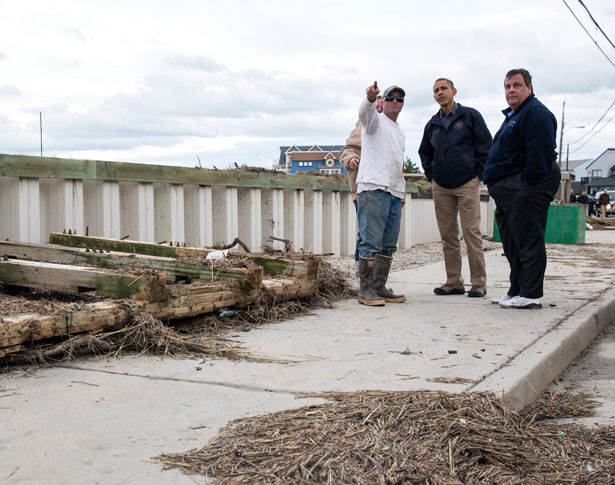
Chris Christie and Barack Obama inspect the damage from Hurricane Sandy. (Wikimedia Commons/Pete Souza.)
Editor’s Note: Each week we cross-post an excerpt from Katrina vanden Heuvel’s column at the WashingtonPost.com. Read the full text of Katrina’s column here.
Last week, as news circulated of New Jersey Governor Chris Christie’s weight-loss surgery, so did a video in which Christie parodied his own brand—and the fleece he wore day and night during the Hurricane Sandy crisis. In the video, he asks everybody from Morning Joe to Jon Bon Jovi if they’ve seen his now-missing fleece, without which he is powerless, like Iron Man without his suit.
The governor may be able to poke fun at the absurdity of, among other things, his rising star, rumored ambitions and “relentless” fleece, but his real shortcomings are no laughing matter.
It was, after all, while wearing that infamous fleece that he raced across his state, doling out no-nonsense quips about recovering from the storm. And who can forget the iconic images of Christie and President Obama surveying the wreckage together, finding love, it seemed, in a hopeless place?
Christie seemed genuinely consumed by the unprecedented destruction caused by what the environmentalist and writer Bill McKibben called a “Frankenstorm….stitched together from some spooky combination of the natural and the unnatural.”
And yet, when asked the obvious question—how Christie would address the climate change challenges that contributed to the superstorm and will, undoubtedly, create more in the future—the famously blunt governor said, “Now maybe, in the subsequent months and years, after I get done with trying to rebuild the state and put people back in their homes, I will have the opportunity to ponder the esoteric question of the cause of this storm.”
Editor’s Note: Each week we cross-post an excerpt from Katrina vanden Heuvel’s column at the WashingtonPost.com. Read the full text of Katrina’s column here.


